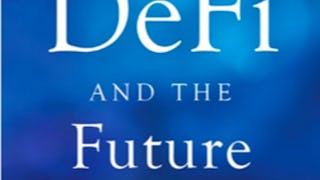DeFi and the Future of Finance is a set of four courses that focus on decentralized finance. The third course is called DeFi Deep Dive. It is essential that you do the first two courses I. DeFi Infrastructure and II. DeFi Primitives before doing this course. It is the longest of the four courses and focuses on some of the leading protocols in the DeFi space. We will look at Credit and Lending (and feature MakerDAO, Compound and Aave), Decentralized Exchange with an analysis of how protocols like Uniswap and Balancer works, Derivatives (featuring Yield Protocol, dYdX and Synthetix) and Tokenization with an analysis of Set Protocol as well as wrapped bitcoin. For many of these leading protocols, we include detailed examples of how the mechanics work. For example, we show how to use a dYdX flash swap to execute an arbitrage transaction (take advantage of different prices on different exchanges for the same asset).


Decentralized Finance (DeFi) Deep Dive
This course is part of Decentralized Finance (DeFi): The Future of Finance Specialization

Instructor: Campbell R. Harvey
16,259 already enrolled
Included with
(303 reviews)
Recommended experience
What you'll learn
Mechanics of credit and lending protocols; Decentralized exchange implementations; Derivatives and tokenization protocols.
Skills you'll gain
Details to know

Add to your LinkedIn profile
4 assignments
See how employees at top companies are mastering in-demand skills

Build your subject-matter expertise
- Learn new concepts from industry experts
- Gain a foundational understanding of a subject or tool
- Develop job-relevant skills with hands-on projects
- Earn a shareable career certificate

There are 4 modules in this course
We begin module one with the mechanics of MakerDAO stablecoin called DAI and introduce the idea of collateralized debt obligations. The module also includes a detailed examination of both Compound and Aave.
What's included
9 videos2 readings1 assignment
The second module explores the mechanics of Uniswap v2 and v3. A generalization of the two asset Automated Market Maker introduced by Balancer is also studied. The module ends with a discussion of rehypothecation as well as Total Locked Value.
What's included
6 videos1 assignment
The third model features leading derivatives protocols. The mechanics of fixed rate lending and borrowing is presented with the Yield Protocol. The mechanics of dYdX and Synthetix are also explored.
What's included
8 videos1 assignment
The final module focuses on tokenization and features the Set Protocol. Set provides a way to combine portfolios much like an ETF holds many traditional stocks. The Sets can be active or passive. The module ends with a discussion of the use in DeFi of both wrapped bitcoin and wrapped ethereum.
What's included
2 videos1 reading1 assignment
Earn a career certificate
Add this credential to your LinkedIn profile, resume, or CV. Share it on social media and in your performance review.
Instructor

Offered by
Explore more from Finance
 Status: Free Trial
Status: Free TrialDuke University
 Status: Free Trial
Status: Free TrialDuke University
 Status: Free Trial
Status: Free TrialDuke University
Why people choose Coursera for their career




Learner reviews
303 reviews
- 5 stars
92.40%
- 4 stars
6.60%
- 3 stars
0.66%
- 2 stars
0.33%
- 1 star
0%
Showing 3 of 303
Reviewed on Jan 24, 2024
Systematic overview of Defi eco system. Course keeps the right level of detail and explains well the core concept of each topic.
Reviewed on Nov 17, 2022
Very clearly and interestingly presented the concept of cryptocurrency and tokens by Professor Harvey with lots of examples. An excellent course !
Reviewed on May 1, 2022
What's more to knowledge than a balance of theory with practice. This course is quite some depth and exciting.

Open new doors with Coursera Plus
Unlimited access to 10,000+ world-class courses, hands-on projects, and job-ready certificate programs - all included in your subscription
Advance your career with an online degree
Earn a degree from world-class universities - 100% online
Join over 3,400 global companies that choose Coursera for Business
Upskill your employees to excel in the digital economy
Frequently asked questions
To access the course materials, assignments and to earn a Certificate, you will need to purchase the Certificate experience when you enroll in a course. You can try a Free Trial instead, or apply for Financial Aid. The course may offer 'Full Course, No Certificate' instead. This option lets you see all course materials, submit required assessments, and get a final grade. This also means that you will not be able to purchase a Certificate experience.
When you enroll in the course, you get access to all of the courses in the Specialization, and you earn a certificate when you complete the work. Your electronic Certificate will be added to your Accomplishments page - from there, you can print your Certificate or add it to your LinkedIn profile.
Yes. In select learning programs, you can apply for financial aid or a scholarship if you can’t afford the enrollment fee. If fin aid or scholarship is available for your learning program selection, you’ll find a link to apply on the description page.
More questions
Financial aid available,


